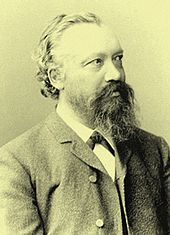Albert Wangerin (mathematician)
Friedrich Heinrich Albert Wangerin (born November 18, 1844 in Greifenberg in Pomerania , † October 25, 1933 in Halle ) was a German mathematician.
Life
Wangerin was the son of master plumber Heinrich Wangerin and his wife Emilie Bathke. From 1853 to 1862 Wangerin attended the secondary school in his hometown. At Easter 1862 he gave the acceptance speech of the high school graduates in Greek as the best student.
Immediately afterwards, he began to study mathematics and physics at the University of Halle. In the main, Professors Eduard Heine and August Rosenberger were his teachers. In 1864 Wangerin moved to Königsberg for two years . There he studied mainly with Professors Franz Ernst Neumann and Friedrich Julius Richelot . On March 16, 1866, Wangerin received his doctorate from Neumann with the dissertation De annulis Newtonianis . At the same time he passed the state examination as a teacher.
He was then employed on April 1, 1866, as a probationary teacher at the Friedrichswerder trade school in Berlin. He passed this probationary period on March 31, 1867 and was employed with effect from April 1 of the same year as an assistant teacher at the Stralauer higher citizen school (later Andreasrealgymnasium), also in Berlin. He held this office until September 30, 1868.
From October 1, 1868 to March 31, 1869 he was a full teacher at the Realschule 1st class in Poznan . During this time Wangerin was also the editor of the yearbook on the progress of mathematics . In April he went back to Berlin and worked as a teacher at the Sophien Realschule in Berlin until March 31, 1876 .
On April 14, 1871, he married Johanna Dorn in Berlin. With her he had two daughters and four sons.
With effect from March 2, 1876, Wangerin was appointed associate professor for mathematics at the Friedrich-Wilhelms-Universität Berlin . Here Wangerin made a living by regularly giving lectures for new students. Six years later, on March 29, 1882, Wangerin was promoted to full professor of mathematics at the University of Halle , where he succeeded his teacher Eduard Heine.
On June 15, 1883 Wangerin was accepted into the Imperial Leopoldine Carolinian Academy of Natural Scientists ( Leopoldina ). When August Rosenberger died in 1891, Wangerin was entrusted as his successor with the management of the university observatory in Halle.
The fact that Wangerin was also politically active can be seen in his election to the Giebichenstein municipal council on May 18, 1892. On November 2 of the same year he was appointed a member of the Oberbergamt zu Halle. As such he had to examine future mountain trainees.
On January 18, 1896, Wangerin was awarded the Red Eagle Order, 4th class. In 1904 Wangerin joined the academy of non-profit science in Erfurt as a corresponding member . As such, he was elected President of the Leopoldina on March 28, 1906 . On May 24, 1907, Uppsala University honored him with an honorary doctorate. Between the winter semester of 1910 and 1911 he was the 215th rector of the University of Halle. On August 24, 1911, Wangerin was honored with the 3rd Class Crown Order .
With effect from September 30, 1919 Wangerin was retired and for health reasons he resigned as President of the Leopoldina on September 8, 1921. He was succeeded by August Gutzmer . On February 19, 1922, the Society made him an honorary member and awarded him the Cothenius Medal .
As a mathematician, he dealt with potential theory , spherical functions and differential geometry . In the series Ostwalds Klassiker , he published several historical mathematical and physical works.
He found his final resting place there in the north cemetery. In 1989 his grave was closed and reassigned.
Fonts
- Theory of spherical functions and related functions, especially Lamé and Bessel (theory of special functions defined by linear differential equations). In: Encyclopedia of Mathematical Sciences, including its applications . Volume 2: Analysis. Part 1, half 2. Teubner, Leipzig 1905, pp. 695–817, ( digitized version ).
- Optics. Older theory. In: Encyclopedia of Mathematical Sciences, including its applications. Volume 5: Physics. Part 3. Teubner, Leipzig 1907, pp. 1-94, ( digitized version ).
- Theory of potential and spherical functions (= Schubert Collection. 58–59). 2 volumes. Göschen et al., Leipzig et al. 1909–1921, ( digitized version ).
- Reduction of the potential equation for certain bodies of revolution to an ordinary differential equation (= prize writings, crowned and published by the Fürstlich-Jablonowskische Gesellschaft zu Leipzig. 18). Leipzig, Hirzel 1875, ( digitized version ).
literature
- Werner Burau : Wangerin, Albert . In: Charles Coulston Gillispie (Ed.): Dictionary of Scientific Biography . tape 14 : Addison Emery Verrill - Johann Zwelfer . Charles Scribner's Sons, New York 1976, p. 158-159 ( online ).
Web links
- Albert Wangerin in the Mathematics Genealogy Project (English)
- John J. O'Connor, Edmund F. Robertson : Albert Wangerin (mathematician). In: MacTutor History of Mathematics archive .
- Literature by and about Albert Wangerin in the catalog of the German National Library
- Entry on Albert Wangerin in the Catalogus Professorum Halensis
- Martin Luther University Halle-Wittenberg: Albert Wangerin (1844–1933)
| personal data | |
|---|---|
| SURNAME | Wangerin, Albert |
| ALTERNATIVE NAMES | Wangerin, Friedrich Heinrich Albert (full name) |
| BRIEF DESCRIPTION | German mathematician |
| DATE OF BIRTH | November 18, 1844 |
| PLACE OF BIRTH | Greifenberg in Pomerania |
| DATE OF DEATH | October 25, 1933 |
| Place of death | Halle , Saale |
